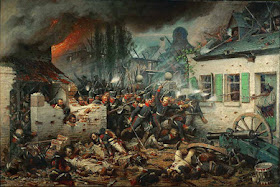As well as guests of other nationalities, many elegant British visitors to that city attended. They had come to the Low Countries in the wake of the Duke of Wellington’s army, or they had fled there from Paris, where they had been celebrating the fall of his nemesis, Napoleon, the previous year – right up to the time that the Emperor had reappeared in France and effortlessly eased his way back into power, less than three months earlier.
The ball was a glittering affair, but with a painful ending. When disturbing news reached Wellington, he asked the Duke of Richmond whether he had a map. Soon after, Wellington, staring at the map, exclaimed “Napoleon has humbugged me, by God; he has gained twenty-four hours' march on me.”
One of the guests at the ball, Katherine Arden, wrote that “on our arrival at the ball we were told that the troops had orders to march at three in the morning, and that every officer must join his regiment by that time, as the French were advancing… Those who had brothers and sons to be engaged openly gave way to their grief, as the last parting of many took place at this most terrible ball.”
Napoleon had sent forces to a crossroads, appropriately named Quatre Bras (four arms). Control of the crossroads meant he could move either east towards the Prussian forces under Marshall Blücher, or towards the Anglo-Allied forces under Wellington. The latter, still trying to protect his right wing, had made no move to defend the crossroads, but fortunately some of his Dutch troops had taken it on themselves to take up positions there.
As a result, when Napoleon’s Marshall Ney reached the crossroads he found them held, however lightly, and decided to postpone an attack until the morning. But the allied side reinforced their position overnight.
As a result, when day broke on the Friday, two hundred years ago from Tuesday 16 June of this year, the first fighting was more nearly balanced than might have been expected. Technically, the day was a victory for the allies, since the French left the field. However, Wellington realised that the position was untenable and pulled back to positions he’d scouted previously, along the ridge of Mont St Jean, not far from the town of Waterloo.
 |
| British infantry at Quatre Bras in the “square” defensive formation against cavalry |
By contrast, poor French staff work sent Napoleon’s marshall Grouchy, to “follow” the Prussians, whatever “following” meant.
Two hundred years ago from our Wednesday 17 June, the Saturday of that week, Wellington prepared his positions at Waterloo. He complained that he had “an infamous army, very weak and ill-equipped, and a very inexperienced Staff.” But, in the small hours of the next day – he was up at 2:00 or 3:00 a.m. – he sent a crucial letter to Blücher, assuring him that if he could send one army corps in support, he, Wellington, would stand and fight at Waterloo.
Blücher’s number 2, Gneisenau, was far from convinced that they should trust Wellington. But Blücher insisted they send three corps.
Two hundred years ago from Thursday 18 June, the Sunday of that week – there was no respect for the Sabbath – Wellington commanded 68,000 men, only 25,000 of them British (many of them actually Irish), 20,000 from the King’s possessions in Germany (the British King was also Elector of Hannover), a further 6000 Germans in the King’s German Legion (exiles fighting in the British Army) and 17,000 Dutch-Belgians.
Facing them were 73,000 French commanded by Napoleon himself. He took a leisurely approach to the day, breakfasting well, assuring his officers that the Prussians would need at least two days to reorganise, and once more ordering Grouchy to keep pressing them from the rear.
The ground at Waterloo was sodden, and Napoleon waited some hours for it to dry under the sun. Oddly, no one seems to know exactly when the battle began. The first shots were probably fired at the end of the morning or soon after noon. But the battle made up in ferocity for the delay in its start, and within a few hours Wellington was under acute pressure: at about 4:30, a farm at the centre of his line, la Haye Sainte, fell to the French and his position was fatally weakened.
He desperately needed the Prussians to arrive, but as he told the story, “the time they occupied in approaching seemed interminable. Both they and my watch seemed to have stuck fast.”
However, at much the same time as la Haye Sainte fell, the Prussians were already joining the action. The small numerical advantage of the French was wiped out by the arrival of these 50,000 fresh men. And Grouchy, trying to follow his orders, never showed up with his 33,000.
 |
| Prussian troops investing the village of Plancenoit Just in time, from Wellington's point of view |
Militarily, Britain pulled off a brilliant piece of spin, painting Waterloo as a national victory, although only just over one in five soldiers on the allied side was British and the majority were German.
Britain became the pre-eminent world power for the best part of a century, but that disguised a much more dangerous truth shown by Waterloo: the rise of Germany, under Prussian leadership, as far and away the most effective military force in Europe.
Waterloo. Quite a day. With strange and complex results.
Enjoy the bicentenary!
No comments:
Post a Comment